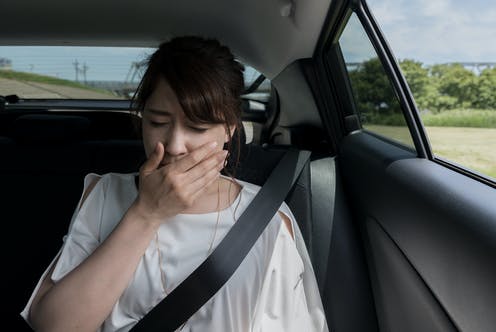
If you’re someone who suffers from motion sickness, travelling in many types of vehicles can be difficult thanks to a host of symptoms like dizziness, lightheadedness, nausea and even vomiting. But it’s not completely clear why some people can read and play games on their phone during a long drive while others spend the journey desperately trying not to be sick. Nor is it clear why some people only experience motion sickness in certain types of vehicles and not others.
But there are two theories that might help explain what’s going on.
The sensory conflict theory proposes that a key player in motion sickness is our balance system. Balance is not maintained by just one single sensory organ. Rather, it combines what we’re seeing and feeling with information from the balance organ in our inner ears, which helps our balance system work out exactly where we are.
If the information from our eyes, inner ears and touch or pressure senses doesn’t match up, it can make us feel off-balance or unsteady. This is why it’s thought that motion sickness is caused by a mismatch of information from our senses – with our eyes and inner ear telling our body that we’re moving, even though we’re actually sitting stationary. This is also why the less sensory mismatch we experience in a vehicle, the less likely we are to experience motion sickness. For example, travelling in a car on a smooth, straight road will cause less sensory mismatch than travelling on a winding road with lots of potholes.
This theory is currently considered the strongest explanation for motion sickness – though we’re still trying to understand the brain mechanisms that cause motion sickness.
An alternate (but related) theory suggests that it’s all down to controlling posture. According to this theory, motion sickness doesn’t happen just because of the mismatch of sensory information. Rather, it’s our inability to adjust our posture to reduce this mismatch of sensory information that makes us feel nauseous. While this makes sense – especially since we can’t always move around when travelling – there isn’t much evidence to support this theory.
No single reason
Motion sickness affects people differently, and there’s no single reason why some people experience motion sickness more frequently than others. But differences in how well a person’s vision and balance systems work will affect how they may feel in different types of vehicles. Certain disorders – including migraines and inner ear diseases, such as Ménière’s disease – increase the likelihood of experiencing motion sickness. Age and sex may also affect likelihood of experiencing motion sickness – with some research suggesting experiences peak around nine or ten years of age, and are more common in women. However, it is uncertain as to why this may be the case.

diy13/ Shutterstock
The type of vehicle people travel in will also have some affect on the amount of motion sickness a person may experience. Broadly, any factor that increases the mismatch between each of the senses that contribute to our balance system will increase the risk of motion sickness. The longer the experience lasts and the larger the size of the movement, the worse the symptoms. For example, travelling on a small boat in a storm for more than eight hours will cause quite severe symptoms – whereas a one-hour train journey will probably have little effect, even if the track isn’t perfectly smooth.
Many people also report experiencing motion sickness when they’re a passenger – not when they’re driving a vehicle. This is probably because drivers are (unsurprisingly) much better at anticipating the motion of a vehicle and move their bodies according to the movement of the vehicle. For example, if a car travels around a sharp bend, the driver is going to be looking ahead and anticipating the movement of the car as they turn – while a passenger is likely to react as the turn happens by leaning in the opposite direction.
Motion sickness also isn’t limited to the “real world”, with cybersickness another type of motion sickness that people get from the virtual environments, often when playing video games. This likely happens because of the sensory conflict of seeing the environment move on the screen while the body remains stationary. Watching films in 3D at the cinema can prompt motion sickness for the same reason.
If you’re someone who suffers from motion sickness, the best thing to do the next time you’re in a vehicle is try to reduce the mismatch of sensory information. So avoid reading in the car – as this causes a mismatch between what we’re seeing and what we’re feeling – and try to instead look out the window. This may help reduce nausea as the visual information now better matches the balance information in our the inner ear. The same is true for boats and trains – focusing on the passing landscape can reduce symptoms.
Other tips to reduce motion sickness include not having a heavy meal before travel, ventilating the vehicle and taking regular stops (when possible). But if these tips aren’t enough to tackle symptoms, using an anti-motion sickness medication may help. These reduce activity in the balance system of the brain or reduce the number of signals the brain sends to the gut, which can help to stop nausea and vomiting.
![]()
Saima Rajasingam is affiliated with the British Academy of Audiology.























